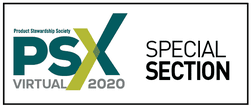DEPARTMENTS
SPECIAL SECTION

Introducing PSX
It has been a year of change for the conference formerly known as Stewardship. Rebranded as PSX, the 2020 event, scheduled to be held this month in Houston, was switched to a virtual-only format due to safety concerns related to the COVID-19 pandemic. Staff have converted the entire conference, including all planned educational sessions, to virtual presentations. In addition, a Virtual Exchange will allow attendees to learn about PSX partner companies that specialize in products and services tailored to product stewardship professionals.
A total of 36 educational sessions are planned for PSX 2020 in 30-minute, 60-minute, and 90-minute formats. On these pages, the Synergist editors preview a few of the planned sessions. For the full program and more information, including how to register, visit the conference website.
OPENING SESSION: BLACK SWANS AND PRODUCT STEWARDSHIP
Tuesday, Sept. 15, 8:00–9:30 a.m. ET
In the midst of what some would call the most significant black swan event in living memory, Opening Session speaker Olaf Isele will discuss the practice of product stewardship in the aftermath of a crisis. Isele, formerly a researcher on baby- and feminine-care products at Proctor & Gamble, will demonstrate how the black swan theory relates to recent global disasters and what product stewards can do to prepare for them in the future. Isele will argue that safety and product stewardship professionals are essential to leading companies through black swan events.
Coined in 2007 by professor and statistician Nassim Taleb, the term “black swan” refers to unpredictable outlier events that have extreme consequences and which are later “explained” as if they were foreseeable. Does the COVID-19 pandemic qualify as a true black swan event? Thousands of years of human experience with infectious diseases suggests we had ample warning. But regardless of how we classify the current crisis, we need to be ready for the next one.
THE EUROPEAN GREEN DEAL: IMPACTS AND OPPORTUNITIES
Tuesday, Sept. 15, 10:00–11:00 a.m. ET
Will the European Green Deal, an attempt to make the European Union’s economy sustainable, be the most significant EU regulation since REACH? Announced in December 2019, the European Green Deal calls for the EU to decouple economic growth from resource use with a goal of zero net emissions of greenhouse gases by 2050. In this session, ExxonMobil’s Patrice Szczygiel will review key elements of the Green Deal, discuss its potential effects on product stewardship, and identify opportunities for industry.
Product Stewardship Society’s Signature Event Debuts New Name, Format
OEBS: A PRACTICAL TOOL FOR RISK ASSESSMENT
Tuesday, Sept. 15, 1:30–3:00 p.m. ET
Occupational exposure bands, or OEBs, have gained acceptance among occupational health and safety professionals as a way to maintain protections for workers exposed to substances that do not have occupational exposure limits. This session explores a similar process known as occupational hazard categorization in use at manufacturing environments for active pharmaceutical ingredients. Presenter Sol Bobst of ToxSci Advisors will lead attendees through exercises that demonstrate applications of occupational hazard categorization and occupational exposure banding. For more information on OEBs, see the article “The NIOSH Decision Logic for OEBs” in the March 2016 Synergist.
A DATA SCIENTIST, AN ENVIRONMENTALIST, AND AN AI WALK INTO A BAR
Wednesday, Sept. 16, 8:00–9:00 a.m. ET
According to the United Nations Environment Programme, since 1972 there has been a 38-fold increase in the number of environmental laws promulgated worldwide. Because new laws continue to proliferate, programmatic solutions to the daunting challenge of reading and interpreting environmental regulations promise to save a potentially enormous amount of time and energy. Co-presenters Rebecca Morones, Brett Benefield, and Debra Neuman-Horn, all from IBM, will describe a project that uses artificial intelligence to determine which regulations can be applied to specific products.
THE EU WASTE FRAMEWORK DIRECTIVE AND SCIP DATABASE
Wednesday, Sept. 16, 8:00–9:00 a.m. ET
Established under the EU’s Waste Framework Directive, the SCIP database collects data on substances of concern in articles or products. Beginning Jan. 5, 2021, companies supplying articles that contain substances of very high concern (SVHCs) on the EU market must submit information on these articles to the European Chemicals Agency. SCIP is intended to ensure this information is available throughout the product lifecycle, including at the waste stage. In this session, James Calder of Assent Compliance will explain how to create a SCIP submission, discuss reporting expectations, and share best practices for compliance.
HOW TO EFFECTIVELY NAVIGATE THE TSCA NEW CHEMICAL NOTIFICATION PROCESS
Wednesday, Sept. 16, 8:00–9:00 a.m. ET
EPA’s risk-based approach to assessing new chemicals under the Toxic Substances Control Act uses conservative modeling to estimate toxicological properties as well as exposure. Delays can ensue if the appropriate information is not provided to the agency, and EPA may respond by regulating a chemical through “consent orders” and Significant New Use Rules. In this session, Ramboll colleagues Ashish Deshmukh, David Liu, and Gavin Thompson provide examples of challenges faced by submitters of chemical information and discuss practical approaches for preparing notifications to facilitate EPA’s review.
TOWARDS A CIRCULAR ECONOMY FOR PLASTICS
Wednesday, Sept. 16, 1:30–2:00 p.m. ET
Only 12 percent of plastics are recycled worldwide. Many companies have set ambitious goals for using recycled, sustainable materials for their products and packaging, but they need the help of product stewards to reach those goals. In this session, John Hott of Eastman will discuss recycling technologies currently available that can help achieve a circular economy for plastics.
THE CHEMICAL SUPPLY CHAIN AND EMERGENCY RESPONSE
Wednesday, Sept. 16, 4:00–5:00 p.m. ET
Who is responsible for a transportation incident that results in an accidental chemical release? In such an emergency, the “legal owner” of the chemical is not typically the first company to be contacted. That distinction often falls on the company in the chain that is most readily identifiable or best placed to provide support, which can increase that company’s risk exposure. This session, presented by Craig Thomson of the United Kingdom’s National Chemical Emergency Centre, describes a typical chemical supply process and discusses typical incidents that can take place throughout a product’s journey. (For more on supply chains, see the article earlier in this issue.)
CLOSING SESSION: GETTING SUSTAINABILITY RIGHT
Thursday, Sept. 17, 10:30 a.m.–12:00 p.m. ET
Decisions on product design and material selection have sometimes led to an increase in solid waste, products, and materials that use high levels of carbon or energy, and restrictions on human rights. In the closing session of PSX 2020, an interactive panel of leaders in product stewardship will address ways that product stewards can help decision makers in their organizations fully understand the effects of sustainability throughout the entire value chain. Panelists include Connie Hensler of Interface, James Fava of Anthesis, Bruce Vignon of Breveja Environmental Consulting, and Al Iannuzzi Jr. of The Estee Lauder Companies.
RESOURCES
The Conversation: “Coronavirus Is Significant, But Is It a True Black Swan Event?” (April 2020).
European Chemicals Agency: “SCIP Database.”
European Commission: “A European Green Deal.”
PSX Virtual.
United Nations Environment Programme: “Dramatic Growth in Laws to Protect Environment, But Widespread Failure to Enforce, Finds Report” (January 2019).
PSX 2020 will be held online Sept.15–17. For more information, visit the conference website.


